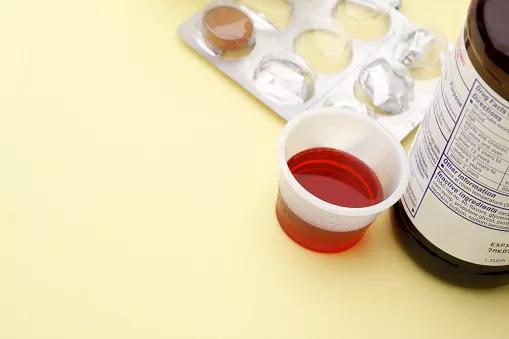The Short Answer from a family medicine physician

Image content: This image is available to view online.
View image online (https://assets.clevelandclinic.org/transform/fc2e8f79-07c4-4f1b-8fd3-67fa7cb7ef92/GettyImages-471168619_jpg)
Medicine cup filled with cough syrup next to cough medicine and nearly finished packet of lozenges
A: A visit to the pharmacy reveals row after row of lozenges, syrups and other products for cough associated with wintertime virus. Most are helpful and reasonably safe.
Advertisement
Cleveland Clinic is a non-profit academic medical center. Advertising on our site helps support our mission. We do not endorse non-Cleveland Clinic products or services. Policy
When choosing cough drops or rubs, keep in mind that “medicated” products aren’t truly medicated. They usually contain menthol, an aromatic substance that opens the airways to help reduce cough and congestion.
Cough syrups can contain any combination of these over-the-counter medicines:
(Parents should be aware that cough syrups and menthol rubs are not recommended for children. Cough lozenges and honey are fine after age 1.)
A couple of prescription medications can suppress cough: benzonatate (Tessalon Perles®) and promethazine cough syrup. Both are effective and non-narcotic.
But by far the simplest, safest treatment for cough and congestion is good hydration: drinking lots of fluids or rinsing the nasal passages with a saline solution.
— Family medicine physician Donald Ford, MD
Advertisement

Delivered every Tuesday!
Sign up for our Health Essentials emails for expert guidance on nutrition, fitness, sleep, skin care and more
It's a letter about the news!

Every two weeks once
Sign up for our Health Essentials emails for expert guidance on nutrition, fitness, sleep, skin care and more.
Learn more about our editorial process.
Advertisement
Kids under 4 shouldn’t use cough and cold medicine — older kids may or may not benefit
Germ-killing chemicals in the water can lead to respiratory issues
Taking a warm shower before bed and drinking warm liquids throughout the day can help
Steam, cold air and extra snuggle time can help manage that seal pup bark
When to be evaluated for a cough that won't improve
The best way to prevent others from getting sick
Dry or wet, acute or chronic — it may point to a cause
A couple essential oils may be used with caution, but there are safer and more effective options
Type 2 diabetes isn’t inevitable with these dietary changes
Applying a hot or cold compress can help with pain
Pump up your iron intake with foods like tuna, tofu and turkey